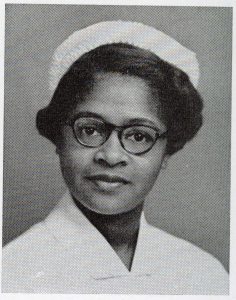
Esther E. McCready, University of Maryland, School of Nursing Class of 1953. The first African American Graduate of the school. 1953 Terra Mariae Yearbook.
Culminating Black History month and ushering in March’s Women’s History Month, is Esther E. McCready, School of Nursing, Class of 1953. McCready was born on January 10, 1931 in Baltimore, MD; she graduated with honors from Dunbar High School in 1948. During high school she worked as a nurses’ aid at Sinai Hospital maternity ward and following graduation worked at Johns Hopkins Hospital’s records department, which lead to her to choose the nursing profession.
In 1949 McCready requested an application to the University of Maryland’s School of Nursing knowing the school only accepted white students. She submitted the application to start in August 1949 and waited months for the school’s response—repeated inquiries to the school indicated that her application was being reviewed. Instead of fighting for acceptance into the University of Maryland, McCready could have attended Provident Hospital’s nursing program in Baltimore or attend Meharry Medical College in Tennessee, a nursing school for African Americans. Instead McCready contacted the National Association for the Advancement of Colored People (NAACP) and with their help took her case to court.
Ironically, the NAACP connected her with attorney Donald Murray, the first African American graduate of UM’s School of Law, as well as the Dean of Howard University’s School of Law, Charles Hamilton Houston. Murray had gained admission after winning a court case in 1935, which lead to the creation of a Maryland State law legalizing segregation in the University of Maryland. After losing her first case in the Baltimore City Courts, McCready, adding Thurgood Marshall to her legal team after Murray became too ill to represent her, took the case to the Maryland State Court of Appeals. This court sided with McCready, stating she had the education and character requirements for admittance to the school but was denied due to her race she was therefore denied equal protection of the laws.
After winning her case in April 1950, McCready entered the School of Nursing. She faced many difficulties and discrimination in the school but persevered to become the first African American to graduate from the School of Nursing in 1953. She was also the first woman African American to graduate from the University of Maryland Baltimore. Following graduation, McCready served in several nursing positions in Maryland and New York. She earned a Masters Degree in music from the Manhattan School of Music and performed with the Metropolitan Opera throughout the United States and Europe. She taught in the New York Public School System for 17 years. In 2004, she was elected to the Maryland Women’s Hall of Fame and has served on the University of Maryland School of Nursing’s Board of Visitors.
References:
Eilertsen, A., (January 27, 2017) “Esther McCready: A nursing hero you should know.” American Nursing Association Website. Retrieved from: https://community.ana.org/blogs/amy-eilertsen/2017/01/27/esther-mccready-a-nursing-hero-you-should-know
Maryland Commission for Women. (2004) “Esther McCready.” Maryland Women’s Hall of Fame Website. Retrieved from: https://msa.maryland.gov/msa/educ/exhibits/womenshall/html/mccready.html
“McCready Fought for the Right to be Trained as a Nurse.” (June 22, 2005). The Sun. Baltimore: 1E. Retrieved from: http://proxy-hs.researchport.umd.edu/login?url=https://search.proquest.com/docview/406661906?accountid=28672
Pollitt, P., (February 15, 2016) “Esther McCready, RN: Nursing Advocate for Civil Rights” OJIN: The Online Journal of Issues in Nursing Vol. 21 No. 2. Retrieved from: http://ojin.nursingworld.org/MainMenuCategories/ANAMarketplace/ANAPeriodicals/OJIN/TableofContents/Vol-21-2016/No2-May-2016/Articles-Previous-Topics/Esther-McCready-RN-Nursing-Advocate-for-Civil-Rights.html#Hobbs

